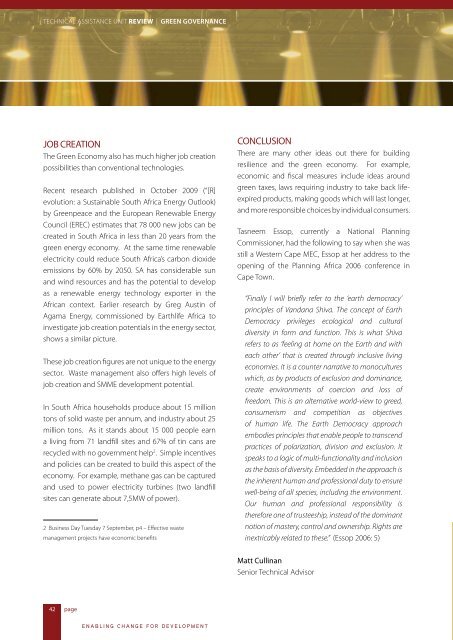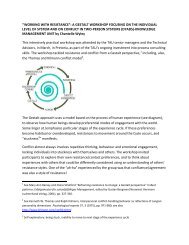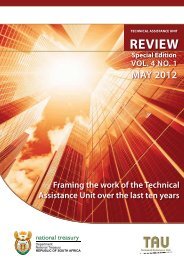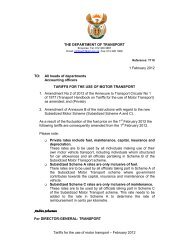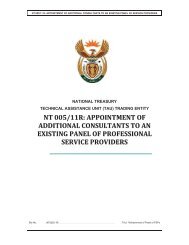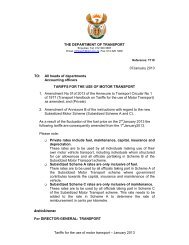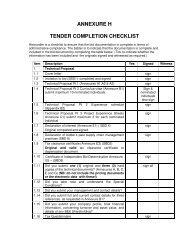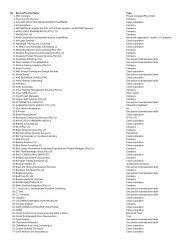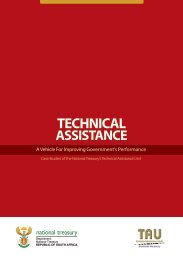Review 3 final 2 - TAU - National Treasury
Review 3 final 2 - TAU - National Treasury
Review 3 final 2 - TAU - National Treasury
You also want an ePaper? Increase the reach of your titles
YUMPU automatically turns print PDFs into web optimized ePapers that Google loves.
TECHNICAL ASSISTANCE UNIT REVIEW | Green Governance<br />
Job creation<br />
The Green Economy also has much higher job creation<br />
possibilities than conventional technologies.<br />
Recent research published in October 2009 (“[R]<br />
evolution: a Sustainable South Africa Energy Outlook)<br />
by Greenpeace and the European Renewable Energy<br />
Council (EREC) estimates that 78 000 new jobs can be<br />
created in South Africa in less than 20 years from the<br />
green energy economy. At the same time renewable<br />
electricity could reduce South Africa’s carbon dioxide<br />
emissions by 60% by 2050. SA has considerable sun<br />
and wind resources and has the potential to develop<br />
as a renewable energy technology exporter in the<br />
African context. Earlier research by Greg Austin of<br />
Agama Energy, commissioned by Earthlife Africa to<br />
investigate job creation potentials in the energy sector,<br />
shows a similar picture.<br />
These job creation figures are not unique to the energy<br />
sector. Waste management also offers high levels of<br />
job creation and SMME development potential.<br />
In South Africa households produce about 15 million<br />
tons of solid waste per annum, and industry about 25<br />
million tons. As it stands about 15 000 people earn<br />
a living from 71 landfill sites and 67% of tin cans are<br />
recycled with no government help 2 . Simple incentives<br />
and policies can be created to build this aspect of the<br />
economy. For example, methane gas can be captured<br />
and used to power electricity turbines (two landfill<br />
sites can generate about 7,5MW of power).<br />
2 Business Day Tuesday 7 September, p4 – Effective waste<br />
management projects have economic benefits<br />
Conclusion<br />
There are many other ideas out there for building<br />
resilience and the green economy. For example,<br />
economic and fiscal measures include ideas around<br />
green taxes, laws requiring industry to take back lifeexpired<br />
products, making goods which will last longer,<br />
and more responsible choices by individual consumers.<br />
Tasneem Essop, currently a <strong>National</strong> Planning<br />
Commissioner, had the following to say when she was<br />
still a Western Cape MEC, Essop at her address to the<br />
opening of the Planning Africa 2006 conference in<br />
Cape Town.<br />
“Finally I will briefly refer to the ‘earth democracy’<br />
principles of Vandana Shiva. The concept of Earth<br />
Democracy privileges ecological and cultural<br />
diversity in form and function. This is what Shiva<br />
refers to as ‘feeling at home on the Earth and with<br />
each other’ that is created through inclusive living<br />
economies. It is a counter narrative to monocultures<br />
which, as by products of exclusion and dominance,<br />
create environments of coercion and loss of<br />
freedom. This is an alternative world-view to greed,<br />
consumerism and competition as objectives<br />
of human life. The Earth Democracy approach<br />
embodies principles that enable people to transcend<br />
practices of polarization, division and exclusion. It<br />
speaks to a logic of multi-functionality and inclusion<br />
as the basis of diversity. Embedded in the approach is<br />
the inherent human and professional duty to ensure<br />
well-being of all species, including the environment.<br />
Our human and professional responsibility is<br />
therefore one of trusteeship, instead of the dominant<br />
notion of mastery, control and ownership. Rights are<br />
inextricably related to these.” (Essop 2006: 5)<br />
Matt Cullinan<br />
Senior Technical Advisor<br />
42<br />
page<br />
Enabling change for development


